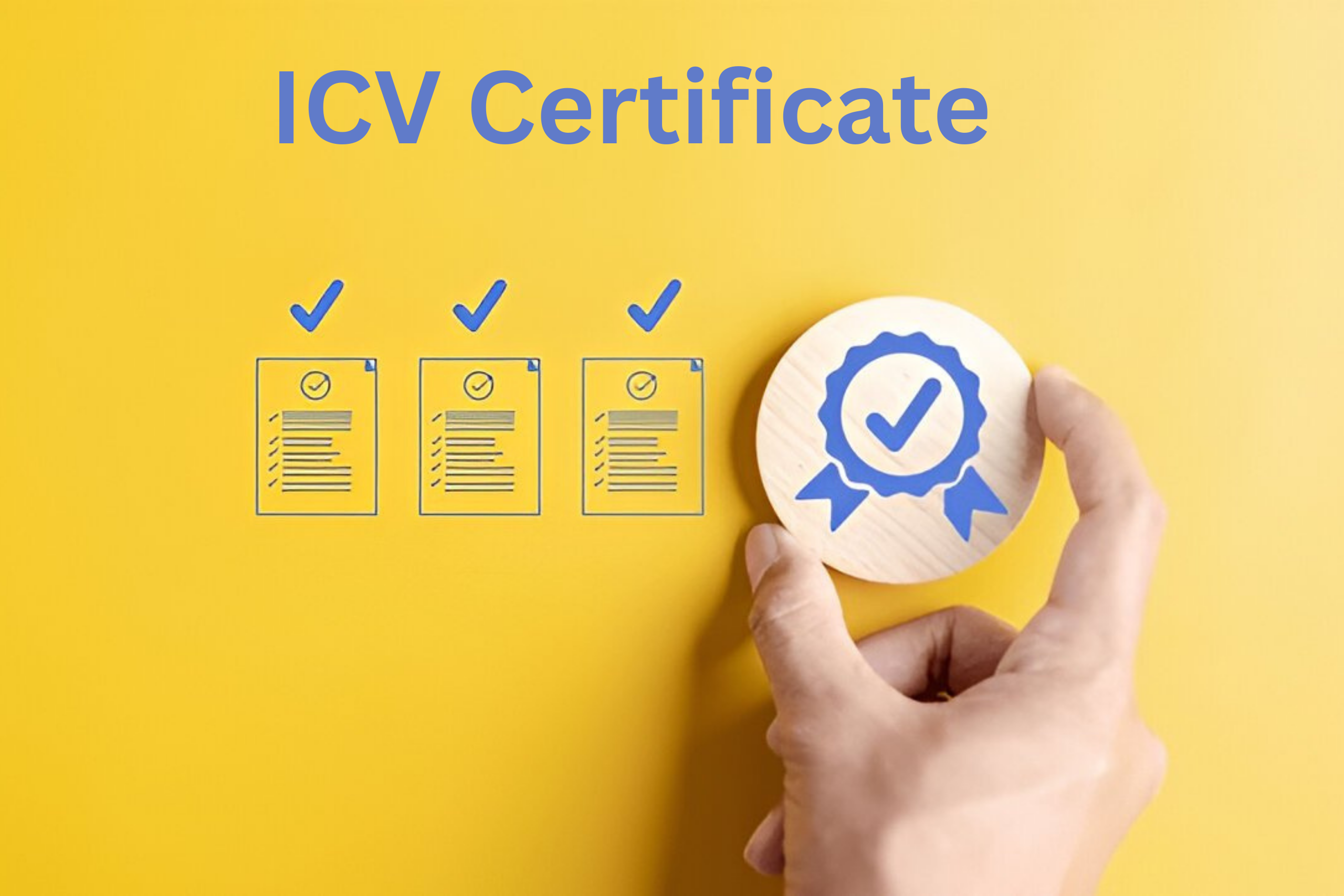Companies with an In-Country Value (ICV) certificate attract more attention when they tender for projects since it demonstrates that they value the local economy. NAK Auditing L.L.C. is a leading ICV certification provider in the UAE and is approved by the concerned authorities. We don’t simply issue certificates; we also take close consultation with our customers to find out their requirements, calculate their ICV, and recommend methods for enhancing their business and operations.

The Abu Dhabi National Oil Company (ADNOC) of the United Arab Emirates initiated the ICV Certification program to measure the volume of goods and services produced by UAE-based businesses, local investment, and employment in the oil and gas sector.
1. The ADNOC of the UAE provides an ICV Certificate, verifying the volume of In-Country Value achieved by a company conducting business there.
→All ADNOC suppliers are now asked to reach an ADCOC certification body for an ICV certificate and provide the submission template of the supplier. In the UAE, the ICV certificate can only be issued by an ICV-approved auditor/audit company. The ICV auditor/audit company will only issue the ICV certificate on the audit report of an entity issued by an approved external auditor/audit company by the government of the UAE.
→The ADNOC program is the extension of the 2030 growth strategy, which is “creating more profitable and valuable business, along with a persistent supply of oil and gas.
2. The Abu Dhabi Department of Economic Development (ADDED) established the Abu Dhabi Local Content Programme (ADLC) and ICV Certification in Abu Dhabi with the following objectives:
1. GDP Growth: Increasing the amount of goods and services sourced locally, increasing foreign direct investment in Abu Dhabi, and increasing the GDP contributions of SMEs and the private sector to promote GDP growth.
2. Human Capital Development: Enhancing local labour force competencies and expanding Emiratis’ access to private sector employment possibilities;
3. Adoption of Technology: Involves increasing R&D spending, increasing the competitiveness of the national sector, and speeding up the creation and use of new technologies.
3. Target Areas of ICV Program:
→ADNOC is contemplating various strategies as the ICV strategy keeps evolving.
→ Organizing training programs for UAE nationals to enhance the expertise and capabilities of the local workforce.
→ Encouraging CAPEX and OPEX development plans to entice foreign capital in the UAE.
→ Building long-term relationships with suppliers.
4. Calculation of ICV Score:
The ICV of an entity is calculated based on the economic value of goods or services provided by the company. The following are regarded as the primary factors.
1• Exports
2• Revenue
3• Third-Party Spend
4• Investment
5• Goods Manufactured
6• Job opportunities for UAE nationals
4.Target Areas of ICV Program:
ADNOC are contemplating various strategies as the ICV strategy keeps evolving.
1.Organizing training programs for UAE nationals to enhance the expertise and capabilities of local work force.
2. Encouraging CAPEX and OPEX development plans to entice foreign capital in the UAE.
3. Building long-term relationship with suppliers.
5.Calculation of ICV Score:
The ICV of an on entity is calculated based on the economic value of goods or services provided by the company. The following are regarded as the primary factors
1• Exports
2• Revenue
3• Third-Party Spend
4• Investment
5• Goods Manufactured
6• Job opportunities for UAE nationals

Over 1,500 Emiratis have been impacted by the ADNOC ICV program since its inception, and the program has infused over Dh44 billion ($12 billion) into the UAE economy. Also, nearly 3,000 UAE companies have been given ICV certification.
1• The ICV certification boosts GDP diversity, accelerates private sector involvement, and domesticates key supply chain parts.
2• Since supply chains are readily localizable, the ICV certification also supports the development and expansion of small- and medium-sized business owners.
3• The agreement between partner companies and federal agencies can be beneficial to the people who have ICV certification.
4• ADNOC normally invites local manufacturing firms to bid directly for a tender while purchasing commodities.
5• Consequently, upon assessment of all purchasing tenders, local manufacturing bidders or their local agents will be preferred over manufacturer agents that are based outside.
6• Consequently, the ICV score of the suppliers increases, benefiting them directly and enhancing the national economy.
In the UAE, companies must fulfil certain eligibility conditions in order to obtain ICV certification. Consider the following factors to determine your eligibility for an ICV certificate.
1• To apply for ICV certification, businesses usually need to have a current trading license and be registered with the relevant government body.
2• They also need to be working on a product or providing a service while physically present in the United Arab Emirates.
3• In addition to these broad standards, organizations must meet specific ICV requirements that are relevant to their industry area.
4• Every sector industry’s individual ICV program guidelines delineate the standards that companies have to achieve to get certified. For example, the ICV program considers, among other things, the level of local content in products and services provided, investment in regional infrastructure and amenities, and the level of Emiratization of the workforce in the oil and gas sector.
5• Firms need to undergo an audit that is performed independently by a certified ICV certification body for ICV certification. Based on the relevant ICV requirements, the certification body will assess the firm’s performance and grant an accreditation in accordance with the ICV score.
6• Overall, the ICV certification obligations are done to ensure that certified companies are dedicated to the growth and development of the UAE and to the domestic economy
By meeting the ICV Financial requirements set by ADNOC and submitting their ICV score to ADNOC, businesses can become ICV Certified in the United Arab Emirates. Companies may have to alter their operations in order to meet the ICV requirements, such as hiring and training more UAE citizens, purchasing more goods and services from local vendors, and boosting local investments.
→You may get ahead of the curve in gaining ICV Certification in the UAE by signing up for NAK Auditing’s ICV audit and certification services. However, the ICV Certification procedure is as follows:
1. Release audited financial statements
ICV certification in the UAE necessitates the submission of audited financial records. Newly created companies under 10 months old must use management accounts or IFRS for economic reports, boosting openness and reliability for stakeholder trust.
2. Fill ICV Certification
Companies are required to adhere to the program’s criteria, and the ICV template is used to calculate a company’s ICV score, which evaluates elements including local sourcing, investment in community amenities, and Emirati employment.
3. Evaluation of Form
Businesses must approach designated certifying bodies, which possess the skills and resources needed to evaluate the ICV template and accompanying materials and carry out an on-site audit to verify the information, to receive ICV certification in the United Arab Emirates.
4. Obtain IVC Certificate
Once the ICV template and supporting documents are reviewed, the certifying authority certifies the ICV certificate, which concludes the UAE ICV certification process. This certification may qualify companies for special government tenders and indicates a firm’s commitment to the local economy.
An ICV UAE certification normally holds a 14-month validity period from the time the audited financial documents are submitted, or upon the release of new financial statements (whichever comes first). Companies need to renew their ICV certification in order to continue enjoying ICV benefits after one year.
Firms are required to file updated financial statements and fill out a new ICV template during the renewal process to demonstrate that they continue to be in compliance with the guidelines of the program. The certifying organization will then review the updated information and, if the firm continues to comply with the requirements of the ICV program, release a renewed ICV certificate.
Businesses need to remain compliant with the ICV criteria year-round in order to make sure that their ICV score complies with the standards for renewal.
UAE-Based ADNOC-Approved ICV Auditors
→Here are some important factors to look for and improve upon if you have decided to obtain an ICV certification.
1• International Financial Reporting Standards (IFRS) financials: The required accounting standards in Dubai, IFRS, must be followed by the financial statements that are filed for ICV.
2• Branches’ eligibility for one certificate: Companies with two or more branches in the Emirates under a single ownership are qualified for ICV Certification.
3• Owner salary credits: If an owner is enrolled in the Wage Protection System (WPS), their salary will be covered. Each owner will only be able to spend AED 120,000 every month.
4• Internal costs: All of a supplier’s internal costs will be excluded from the calculations, except depreciation costs.
5• Headcount of employees: The number of workers will be counted for a year.
6• Credit to mainland suppliers: You will receive a 10% bonus in your ICV Score if you are a supplier from the United Arab Emirates’ mainland.
7• Payments to governmental authorities: The supplier’s payments to licensed organizations and governmental free zone authorities will be recorded as 100% ICV.
Based in the United Arab Emirates, NAK Auditing L.L.C. is a respectable auditing company that provides a variety of financial and compliance services to companies of all kinds. Being an authorized ICV auditor with ADNOC, we are able to offer businesses in the UAE full ICV Certification Services.
To guarantee that their adherence to the ICV requirements is precisely assessed and represented in their ICV score, our ICV Auditors collaborate closely with customers. Clients may be confident of a thorough and dependable ICV audit process that satisfies ADNOC criteria by working with NAK Auditing L.L.C.
Here are some common questions about ICV Certificate Services
A Certificate of ICV in the UAE is a formal document under the National In-Country Value (ICV) Programme, aimed at quantifying and certifying a business firm’s contribution to the UAE economy in terms of local procurement, Emirati labour employment, and investments within the country. It is a vital prerequisite for bidding on government and ADNOC tenders, and assists firms in acquiring a local contract competitive advantage.
All suppliers and contractors bidding for contracts with ADNOC, other government bodies, and participating private sector organizations typically need an ICV certificate.
Your company’s localization is indicated by the ICV score, including how much you invest in UAE-based suppliers, how many Emiratis are employed, investment in infrastructure and R&D, and other qualifying categories.
ICV-certified businesses gain preferential access in government tenders, opportunities for contract awards, and signal commitment to economic development to private clients.
1.Company Business Details
2.Financial Documents
3.Employee and Payroll Information
4.Contractual and Procurement Records
1.ICV Application Documents
Together, these reports help validate the company’s economic contribution to the United Arab Emirates through capital investments, employment of UAE residents, local spending, and other qualifying activities. For the ICV certification procedure to go smoothly, these documents must be submitted correctly and on time.
2• Assuming the ICV Audit Score
ICV certification scores are determined by surveying the financial worth include inside the UAE for the merchandise or administrations offered by the company, as indicated by a pre-characterized approach.
Related Services: Audit Services in Dubai, Accounting Services in Dubai, ESR Services
The accompanying territories are thought about:
• Goods made
• Third-party spend
• Revenue
• Exports
• Investment
• Emiratisation
• Expatriate commitment
WhatsApp us
Social Profiles